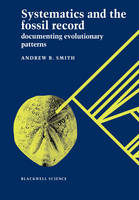
Systematics and the Fossil Record
Documenting Evolutionary Patterns
Seiten
1994
Wiley-Blackwell (Verlag)
978-0-632-03642-4 (ISBN)
Wiley-Blackwell (Verlag)
978-0-632-03642-4 (ISBN)
This text sets out to establish the role played by systematics in deciphering patterns of evolution from the fossil record. It begins by considering the nature of species in the fossil record and then outlines recent advances in the methodology used to establish phylogenetics relationships.
This new text sets out to establish the key role played by systematics in deciphering patterns of evolution from the fossil record. It begins by considering the nature of the species in the fossil record and then outlines recent advances in the methodology used to establish phylogenetics relationships, stressing why fossil evidence can be crucial. The way species are grouped into higher taxa, and how this affects their utility in evolutionary studies is also discussed. Because the fossil record abounds with sampling and preservational biases, the book emphasizes that observed patterns can rarely be taken at face value. It is argued that evolutionary trees, constructed from combining phylogenetic and biostratigraphic data, provide the best approach for investigating patterns of evolution through geologic time.
The only integrated text covering the study of evolutionary patterns from a phylogenetic stance.
This new text sets out to establish the key role played by systematics in deciphering patterns of evolution from the fossil record. It begins by considering the nature of the species in the fossil record and then outlines recent advances in the methodology used to establish phylogenetics relationships, stressing why fossil evidence can be crucial. The way species are grouped into higher taxa, and how this affects their utility in evolutionary studies is also discussed. Because the fossil record abounds with sampling and preservational biases, the book emphasizes that observed patterns can rarely be taken at face value. It is argued that evolutionary trees, constructed from combining phylogenetic and biostratigraphic data, provide the best approach for investigating patterns of evolution through geologic time.
The only integrated text covering the study of evolutionary patterns from a phylogenetic stance.
Andrew B. Smith is associate professor in the Archaeology Department, University of Cape Town, South Africa. He received his Ph.D. in 1974 from the University of California, Berkeley, and has taught and worked in the United States, and many countries in north, west and southern Africa.
Introduction. Species in the fossil record.
Parsimony, phylogenetic analysis and fossils.
Higher taxa.
The nature of biostratigraphical data.
Phylogenetic trees.
Patterns from the fossil record
| Erscheint lt. Verlag | 3.5.1994 |
|---|---|
| Verlagsort | Hoboken |
| Sprache | englisch |
| Maße | 173 x 244 mm |
| Gewicht | 510 g |
| Themenwelt | Naturwissenschaften ► Geowissenschaften ► Mineralogie / Paläontologie |
| ISBN-10 | 0-632-03642-7 / 0632036427 |
| ISBN-13 | 978-0-632-03642-4 / 9780632036424 |
| Zustand | Neuware |
| Informationen gemäß Produktsicherheitsverordnung (GPSR) | |
| Haben Sie eine Frage zum Produkt? |
Mehr entdecken
aus dem Bereich
aus dem Bereich
Buch | Softcover (2024)
Shaker (Verlag)
CHF 27,70
Von Prinz Eugen und der Seekuh in Ottakring: eine Zeitreise durch die …
Buch | Softcover (2024)
Naturhistorisches Museum (Verlag)
CHF 27,85


